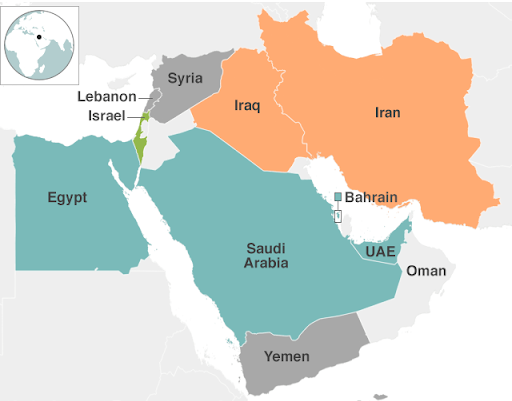International Relations
Israel-UAE Peace Deal
- 14 Aug 2020
- 5 min read
Why in News
Recently, the President of the USA has announced that Israel and the United Arab Emirates (UAE) have agreed to establish full diplomatic ties as part of a deal to halt the annexation of occupied land sought by the Palestinians for their future state.
- Both the UAE and Israel are the USA’s close allies in West Asia.
Key Points
- The UAE has become the first Gulf Arab state to do so and only the third Arab nation to have active diplomatic ties with Israel.
- Egypt made a peace deal with Israel in 1979, followed by Jordan in 1994.
- Under the deal, Israel would suspend its plans to annex large parts of the occupied West Bank.
- The West Bank is sandwiched between Israel and Jordan. One of its major cities is Ramallah, the de facto administrative capital of Palestine.
- Israel took control of it in the Six-day Arab-Israeli war, 1967 and has over the years established settlements there.
- A joint statement from the USA, the UAE and Israel has been issued which says that delegations would meet in the coming weeks to sign deals on direct flights, security, telecommunications, energy, tourism and health care.
- It remains unclear what prompted Israel and the UAE to make the announcement now.
- In June 2020, the UAE’s ambassador to the USA warned that Israel’s plan to annex the Jordan Valley and other parts of the occupied West Bank would upend Israel’s efforts to improve ties with Arab nations.
- Background:
- Formed in 1971, the UAE is a USA-allied federation of seven sheikhdoms on the Arabian Peninsula which did not recognise Israel over its occupation of land home to the Palestinians.
- The UAE relied on white-collar (people who perform professional, desk, managerial or administrative work) Palestinians in creating its nation and maintained its stance that Israel should allow the creation of a Palestinian state on land it seized in the 1967 war.
- In recent years, ties between Gulf Arab nations and Israel have quietly grown, in part over their shared enmity of Iran and the Lebanese militant group Hezbollah.
- The UAE also shares Israel’s distrust of Islamist groups like the Muslim Brotherhood and the militant group Hamas that holds the Gaza Strip.
- Impact on the UAE:
- The deal smoothens the UAE’s international campaign to be seen as a beacon of tolerance in the Middle East despite being governed by autocratic rulers.
- It puts the UAE out first in a regional recognition race among neighbouring Gulf Arab states.
- Impact on Israel:
- The announcement justifies the year-long claims of Israeli Prime Minister Benjamin Netanyahu that his government enjoys closer ties to Arab nations than publicly acknowledged.
- The deal gives Netanyahu a domestic boost at a time when Israel’s coalition government is facing infighting and the possibility of early elections.
- Impact on the USA:
- The recognition grants a diplomatic win to the USA President Donald Trump ahead of the November election.
- Neither his efforts to bring the war in Afghanistan to an end nor efforts to bring peace between Israel and the Palestinians have been successful yet.
- The recognition grants a diplomatic win to the USA President Donald Trump ahead of the November election.
- For Palestine:
- For Palestinians, who long have relied on Arab backing in their struggle for independence, the announcement marked both a win and setback for the Israel-Palestine relations.
- While the deal halts Israeli annexation plans, the Palestinians have repeatedly urged Arab governments not to normalize relations with Israel until a peace agreement establishing an independent Palestinian state is reached.
- For Palestinians, who long have relied on Arab backing in their struggle for independence, the announcement marked both a win and setback for the Israel-Palestine relations.
Way Forward
- The deal marks a historic day and a significant step forward for peace in the Middle East.
- Opening direct ties between two of the Middle East’s most dynamic societies and advanced economics will transform the region by spurring economic growth, enhancing technological innovation and forging closer people-to-people relations.





